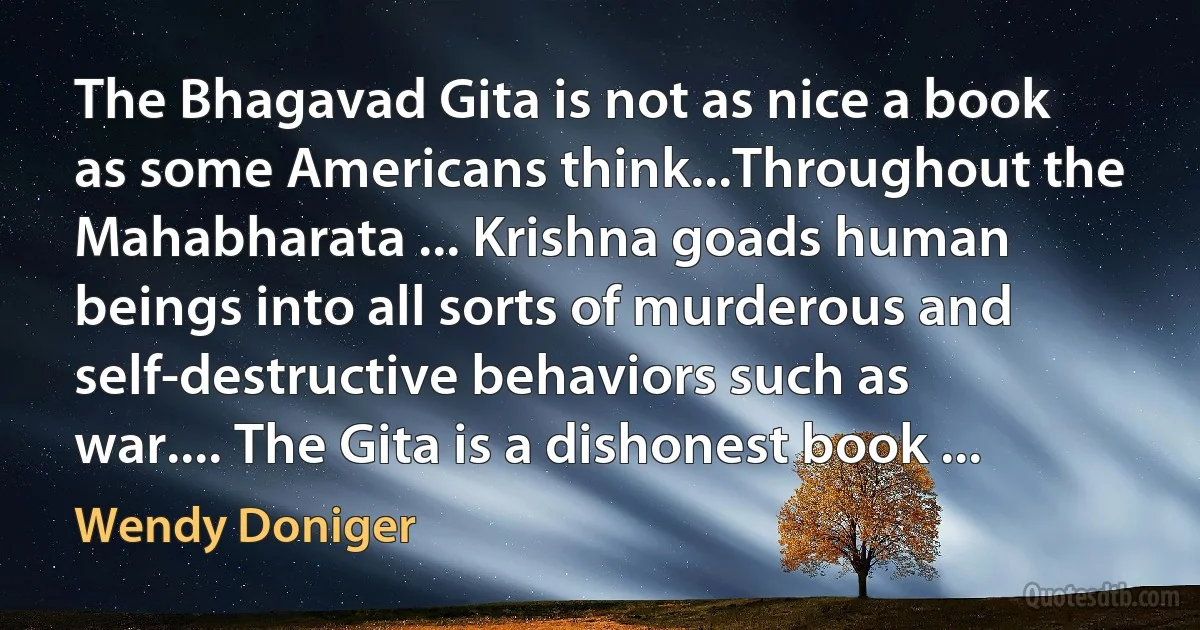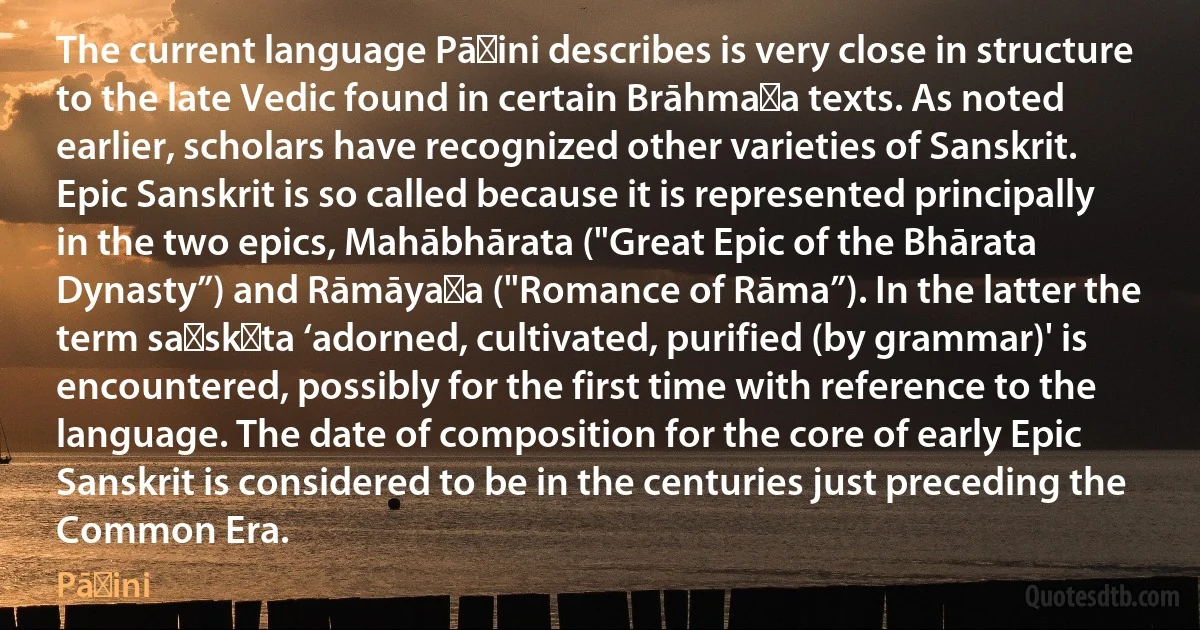Mahabharata Quotes
Vyasa wrote the first 40,000 verses and this book was named Jaya. Afterwards other writers added more stories and it became known as Bharata. Later still more additions were made until the composition became the Mahabharata as we know it today.... We believe that Veds Vyasa was one person and that he alone composed the entire Mahabharata consisting of 100,000 verses, it is the world's largest epic in existence today and an encyclopedia of knowledge.

Vyasa
She called three gods to father his sons. Dharma, or Yudhisthira, was born of god Yama, also called [[Dharma, the god of death and regulation. A year later the second son Bhima was born of the wind god. He was a giant in stature and powers. The next year, the third son Arjuna was born of Indra, the king of gods. These three sons are called Kaunteya (sons of Kunti) in the Mahabharata. Kunti's co-wife Madri begged Pandu to ask Kunti to give her a mantra too. Kunti did so. Madri called the twin gods Ashvini and gave birth to twins called Nakula and Sahadeva. They were called Madreya, sons of Madri. All the five children were collectively called Pandavas, the sons of Pandu.

Kunti
Ahalya and Draupadi – are ayonijasambhava, "not-of-woman-born”. Of the five kanyas, none quite measure up to the standard of monogamous chastity, commended so overwhelmingly in our culture. Each has had either an extra-marital relationship or more than one husband. Draupadi and Kunti are celebrated in Vyasa's Mahabharata.

Kunti
Just as the Bible teaches the Golden Rule - "Do unto others as you would have others do unto you” - the Mahabharata (5.39.57), predating the Bible, teaches a similar truth, and in almost the exact same wording. Yogis and spiritual adepts in India extend the teaching to its logical limits, showing kindness to all species of life - and this, of course, means vegetarianism. It is hard to be kind to animals if you are eating them. In other words, if you don't want someone eating your entrails, don't eat the entrails of others.

Steven J. Rosen
The two sets of sources, textual and nontextual, reveal bits of history to us in different ways, like the lame man riding on the shoulders of the blind man. When it comes to history, you can't trust anyone: The texts lie one way, while images and archeology mislead us in other ways. On the one hand, the gods did not fly around in big palaces, as the texts insist that they did, and we cannot know if women really did speak up as Gargi does in the Upanishads, or Draupadi in the Mahabharata.

Wendy Doniger
The Mahabharata carries a complete picture of this cultural unity in its tîrtha-yãtrã-parva, which is part of the larger Vana-parva. The Pandavas accompany their Purohita, Dhaumya, on a long pilgrimage to all parts of Bharatavarsha. They pay their homage to many mountains, rivers, saMgamas, lakes, tanks, forest groves and other sacred shrines which had become hallowed by association with Gods and Goddesses, rishis and munis, satees and sãdhvees, heroes and heroines. And they feel fulfilled as they never did before or after in their long lives. The same Pandavas made an imperial conquest of the whole country, not once but twice and performed a rãjasûya yajña at the end of each triumph. But the Pandava empire is a faint memory of the forgotten past. On the other hand, the sacred spots which the Pandavas visited during their one and only pilgrimage, draw millions of devotees in our own days as they did in the distant past, long before the Pandavas appeared on the scene.

Sita Ram Goel
Mahabharata is also a division of the Vedas, but it is meant for women, sudras and dvija-bandhus, the worthless children of the higher section. The less intelligent section of society can avail themselves of the Vedic instructions simply by studying the Mahabharata.

A. C. Bhaktivedanta Swami Prabhupada
If in the nineteenth century most scholars identified the Ghaggar-Hakra's course with the Vedic Sarasvati, it is basically for three reasons. The Rig-Veda, the oldest of the four Vedas, mentions various rivers but praises the Sarasvati above all others: it was a "mighty river" flowing "from the mountain to the sea", and one hymn listed it between the Yamuna and the Sutlej - precisely the location of the Ghaggar-Hakra. Secondly, the local traditions regarding the "lost river" of the Indian desert matched those in the post-Vedic literature (including the Mahabharata), which recorded the gradual disappearance of the Sarasvati. Thirdly, scholars noticed a minor tributary of the Ghaggar called "Sarsuti", an obvious corruption of "Sarasvati": it rises in the Sirmur hills that are part of the Shivaliks and was marked on British maps as early as in 1788. Putting these three lines of evidence together, they concluded that the lost Sarasvati could only have flowed in the Ghaggar's bed.

Michel Danino
I was born in the East Indies, once the cradle of poetry, philosophy and history and now their tomb. I belong to that race which composed the Mahabharata and invented chess. But this nation which made codes of it's poems and formulated politics in a game is no longer alive! It survives imprisoned in it's own country. I asked for India liberty and light; as for myself, more happy than my countrymen, i am free - civis sum.

Francisco Luís Gomes
In the Mahabharata, the ceremony for the oath of a new king includes the admonition: 'Be like a garland-maker, O king, and not like a charcoal burner.' The garland symbolizes social coherence; it is a metaphor for dharmic diversity in which flowers of many colors and forms are strung harmoniously for the most pleasing effect. In contrast, the charcoal burner is a metaphor for the brute-force reduction of diversity into homogeneity, where diverse living substances are transformed into uniformly lifeless ashes.

Rajiv Malhotra
Ostensibly the hymn is from the final stage of Rig-Vedic composition, shortly before Veda-Vyasa's final editing of the hymns into the fully-formed Vedas. It soon became the Vedic bedrock of varna doctrine and gets reproduced or quoted to that effect in younger Vedic writings, including the Atharva & Yajur Veda (so, there also interpolations?), the Panchavimsha Brahmana, Taittitiya Aranyaka, Mahabharata and Bhagavata Purana.

Koenraad Elst
Any conscientious scholar of the Adi Granth will be struck by the fact that both in its origin and development, in its soul and body, it belongs to a larger literature of a similar nature and ethos found all over India. And the common source of them all is the Upanishads, the Yogas, the Puranas and the Mahabharata. All the spiritual categories, approach, message, motif, images, metaphors and illustrative material derive from that source, and only the language is regional. But nothing is lost in the repetition and the message remains fresh and invigorating; in fact, it acquires a new confirmation as it is renewed in the lives of Godmen from generation and region to region. The Adi Granth reproduces hundreds of passages and phrases almost verbatim from the older scriptures.

Ram Swarup


